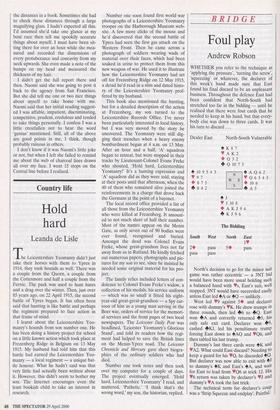Country life
Hold hard
Leanda de Lisle
The Leicestershire Yeomanry didn't just take their horses with them to Ypres in 1914, they took hounds as well. There was a couple from the Quorn, a couple from the Cottesmore and half a couple from the Fernie. The pack was used to hunt hares and a drag over the winter. Then, just over 85 years ago, on 22 April 1915, the second battle of Ypres began. It has often been said that hunting is like battle and perhaps the regiment prepared to face action in that frame of mind.
I learnt about the Leicestershire Yeo- manry's hounds from son number one. He has been doing a history project for school on a little known action which took place at Frezenberg Ridge in Belgium on 13 May 1915. My husband had told him that this battle had earned the Leicestershire Yeo- manry — a local regiment — a unique bat- tle honour. What he hadn't said was that very little had actually been written about it. However, this didn't seem to bother my son. The Internet encourages even the least bookish child to take an interest in research. Number one soon found first world war photographs of a Leicestershire Yeomanry trooper on the Harborough Museum web- site. A few more clicks of the mouse and he'd discovered that the second battle of Ypres had seen the first gas attack on the Western Front. Then he came across a photograph of soldiers wearing wads of material over their faces, which had been soaked in urine to protect them from this new weapon of war. He used it to illustrate how the Leicestershire Yeomanry had set off for Frezenberg Ridge on 12 May 1915, a detail he'd read in a slim and dated histo- ry of the Leicestershire Yeomanry prof- fered by my husband.
This book also mentioned the hunting, but for a detailed description of the action at Frezenberg, my son turned to the Leicestershire Records Office. I've never been particularly interested in local history, but I was very moved by the story he uncovered. The Yeomanry were still dig- ging their trenches when a heavy enemy bombardment began at 4 a.m. on 13 May. After an hour and a half, 'A' squadron began to retreat, but were stopped in their tracks by Lieutenant-Colonel Evans Freke who shouted, 'Hold hard, Leicestershire Yeomanry!' It's a hunting expression and 'A' squadron did as they were told, staying at their posts until that afternoon, when the 40 of them who remained alive joined the reinforcements in a charge that drove back the Germans at the point of a bayonet.
The local record office provided a list of all those from the Leicestershire Yeomanry who were killed at Frezenberg. It amount- ed to not much short of half their number. Most of the names appear on the Menin Gate, as only seven out of 90 bodies were ever found, recognised and buried. Amongst the dead was Colonel Evans Freke, whose great-grandson lives not far away from us in Rutland. He kindly fetched out numerous papers, photographs and pic- tures for my son to see, since he insisted he needed some original material for his pro- ject.
The family relics included letters of con- dolence to Colonel Evans Freke's widow, a collection of his medals, his service uniform — which was so small it fitted his eight- year-old great-great-grandson — a Spy car- toon of him as a young man serving in the Boer war, orders of service for the memori- al services and the front pages of two local newspapers. The Leicester Daily Post was headlined, 'Leicester Yeomanry's Glorious Stand', and told its readers how the regi- ment had helped to save the British lines on the Menin-Ypres road. The Leicester Chronicle and Mercury gave short biogra- phies of the ordinary soldiers who had died.
Number one took notes and then took over my computer for a couple of days. The project eventually emerged. 'Hold hard, Leicestershire Yeomanry' I read, and muttered, 'Pathetic.' I think that's the wrong word,' my son, the historian, replied.


























































 Previous page
Previous page